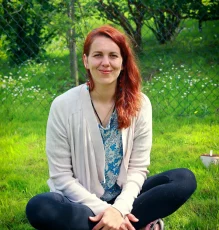Welcome to Lumis
Eclectic Therapy
Rooted in science, inspired by the diversity of human experience
Eclectic Therapy Lumis
Cognitive Behavioural Hypnotherapy for Resilience, Emotional Well-Being, and Self-Acceptance
Welcome to my Cognitive Behavioural Hypnotherapy practice, where modern, evidence-based techniques meet the power of hypnosis to create meaningful change. My approach is straightforward, action-oriented, and designed for those ready to actively build emotional resilience, well-being, and a more accepting mindset toward life’s challenges.
I specialize in combining hypnosis with the problem solving strategies and Rational Emotive Behavioural principles to bring a new philosophy of life that will help to confront challenges, understand & change the beliefs and behaviors that fuel your struggles.
If you’re ready to challenge limiting attitudes, stop overthinking, and embrace a new way of approaching life’s challenges, I would be honoured to support and guide you.
“Be the change you want to see in the world.” Gandhi
Warm regards,
Katarina
I am a certified Hypno-CBT Practitioner, integrating cognitive-behavioural techniques, hypnosis, and structured problem-solving to help you make meaningful changes. I’m also a proud member of Foyth (the Association for professional therapists and practitioners ), BATH (the British Association of Therapist and Hypnotherapists) & IHA (the International Hypnosis Association), an organizations that promote ethical, evidence-based approaches in therapy. Adhering to their code of ethics ensures that I always stay within my scope of competence and prioritize my clients’ best interests!
Who is this for?
Individuals who struggle with social anxiety, stress, muscle tension, and frustration.
Those navigating life transitions and personal challenges.
People who want practical tools to handle emotions effectively.
Anyone ready to challenge limiting beliefs and develop a resilient, problem-solving mindset.
Even for those who want to stop biting their nails!
WHAT TO EXPECT FROM THERAPY
✔ A structured, yet adaptable approach – Every session provides clear strategies tailored to your personal goals, ensuring therapy is both practical and effective.
✔ Evidence-based techniques tailored to your goals. Practical tools for managing emotions, thoughts, and behaviours—strategies that empower you beyond therapy.
✔ A focus on resilience over temporary happiness – Life will always bring challenges, but with the right mindset, you’ll navigate adversity with confidence and emotional stability
✔ Real-world practice – Change happens between sessions, not just in them.
✔ A focus on strengths, values, and personal growth, emphasizing the present and future while reshaping limiting beliefs and rigid demands.
✔ A Safe & non-judgmental approach, adhering to ethical guidelines that ensure respect, transparency, and professional integrity in every session
Cognitive Behavioural Hypnotherapy
As a Cognitive Behavioural Hypnotherapist, I help clients reduce anxiety and stress, build confidence, and develop skills to raise frustration tolerance. My aim is to teach you self-hypnosis, help you experience the benefits of relaxation, and guide you in creatively using your imagination to picture new ways of responding to challenging situations. My training in Cognitive-Behavioural Hypnotherapy (CBH) incorporates various evidence-based approaches, allowing me to tailor techniques to each individual's unique needs.
Imagination is more important than knowledge, a belief that has guided me both personally and professionally. Anxiety often traps us in rigid, unhelpful thinking, causing us to approach problems the same way over and over, even when those strategies no longer serve us. Shifting from a negative problem orientation (where challenges feel overwhelming and unchangeable) to a positive problem-solving mindset (where obstacles become opportunities for growth) is key to self-actualization.
Of course that knowing something logically doesn’t always mean you feel differently right away. REBT philosophy helps you bridge that gap by actively disputing irrational beliefs, practicing new behaviours, and reinforcing rational alternatives over time. The key is unconditional acceptance and persistence. Change happens when you consistently challenge and test your new ways of thinking and responding in real life.

Transforming your relationship with yourself and the world around you.
Reframing Setbacks: A Path to Growth
Imagine you've just lost your job, and your initial thoughts are: "I’m a failure. I’ll never find another good opportunity again. My life is ruined." These beliefs fuel frustration and despair, making it hard to move forward. Using REBT principles, you would pause and challenge these thoughts:
- Identify the irrational belief: "Is losing a job truly the end of the world? Does it define my worth as a person?"
- Dispute the belief: "While losing my job is upsetting, it doesn’t mean I’m a failure. Many successful people have faced job loss and found new opportunities."
- Replace the belief: "This is a setback, but it’s also a chance to reevaluate my goals and explore paths that could lead to even better opportunities."
You might focus on practical steps like updating your CV, networking, or taking time to reflect on what you truly want from your career. By disputing the irrational beliefs and reinforcing rational alternatives, frustration is replaced with hope and action. Over time, this approach builds resilience and helps you view challenges as opportunities for growth.
While I support clients working through difficult experiences, I do not specialize in PTSD treatment and regression therapy. If trauma is your primary concern, I recommend consulting a specialist in this field to ensure the most appropriate care.

Self Acceptance
Self-acceptance is the cornerstone of emotional well-being and personal growth. It means fully embracing yourself as you are. Acknowledging your strengths, weaknesses, imperfections, and everything in between without judgment. Unlike self-esteem, which often conditioned and depends on external validation.
Self-acceptance is about letting go of perfectionism and embracing yourself as you are. Self-acceptance is integral to therapies like ACT, CBT, REBT , helping you challenge distorted beliefs, nurture compassion, and free yourself from the exhausting pursuit of perfection.
This self-compassion fosters resilience, emotional flexibility, and also deepens your connections with others, allowing you to see them as equally fallible yet inherently worthy
human beings.

Emotional Well-being
Emotional and mental well-being is more than just feeling good; it’s about understanding, managing, and navigating your emotions with resilience and balance. It doesn't mean you'll never experience sadness, anger, or fear. These are all healthy emotional responses when they inspire meaningful improvement.
However, they can become unhealthy when they manifest as depression, anxiety, or aggression. True well-being doesn’t mean avoiding sadness or fear but learning from these emotions and addressing them in healthy ways.
By recognizing cognitive distortions, learning to process challenging emotions, you can develop tools to effectively manage stress and find new possibilities. Well-being is an ongoing process that allow you to face life’s ups and downs with clarity and compassion.

Resilience
Resilience is the ability to adapt and recover during challenges and adversity. It’s not about avoiding difficulties but navigating them with strength and flexibility. Resilience allows you to learn, grow, and move forward from tough experiences.
True resilience is rooted in perspective and the attitude you bring to life's challenges. It’s not a trait you’re simply born with; resilience can be developed and nurtured through out the life. Sometimes rigid attitudes can hold us back, preventing emotional growth and learning.
Therapy plays a vital role in this process, providing a safe space to explore those attitudes, reflect, and build upon your strengths. Resilience is not about perfection; it’s about progress. It helps you accept what cannot be changed and move forward with courage and purpose.
With the right tools and support, you can break free from fear, reconnect with your confidence, and take meaningful steps toward self-acceptance and emotional freedom.
My Perspective = My experience
People often find themselves trapped in cycles of negative thinking due to irrational beliefs or attitudes that amplify emotional suffering. Let’s be honest, we all have desires and goals we aim to achieve. When unexpected challenges arise, frustration can take over, and emotions may cloud our judgment.
Such patterns often stem from difficult experiences, moments of public humiliation, harsh criticism, or feelings of failure.
These experiences create lasting imprints, fostering a deep fear of judgment, rejection, or inadequacy. In an effort to avoid vulnerability, individuals may adopt rigid attitudes or self-imposed rules to protect themselves. While this strategy provides temporary relief, it ultimately reinforces unhealthy beliefs and perpetuates a cycle of anxiety.
Over time, these thoughts and mental images become automatic in a way that goes unnoticed, subtly shaping how we perceive reality, even in safe situations. These rigid beliefs begin to dictate how individuals behave, feel, and think, limiting their ability to adapt to new challenges and life difficulties.
However, just because these patterns feel deeply ingrained doesn’t mean they are permanent. The brain has an incredible capacity for change, and with the right tools and mindset, you can shift from rigid, self-defeating thinking to a more rational, flexible, and resilient way of approaching life’s challenges. Just as these rigid beliefs were shaped by past experiences, they can be challenged, disputed, and replaced with rational, helpful beliefs and experiences.
Tools and techniques to help you achieve your goals
Hypnosis isn’t about quick fixes or miracle cures. It’s a collaborative journey where we work together to address your unique challenges and move toward the life you want to live. I’m here to guide you with fresh perspectives and practical strategies, helping you approach your difficulties in new and constructive ways.
What Does That Mean?
I use a combination of proven techniques to help you calm your mind, shift your perspective, and respond differently in tough situations.
You don’t have to keep holding it all together alone. If you’re feeling stuck - whether it’s overthinking, emotional outbursts, or just this nagging sense that things might fall apart - there are practical ways forward.
Through Cognitive Behavioural Hypnotherapy (CBH), I’ll help you navigate your emotions and reclaim the power of your mind.
Effective strategies for managing anxiety and anger issues
Tools & Techniques
Hypnosis & Self-Hypnosis
A natural state of focused imagination. It helps you quiet the noise and create space for new, healthier responses. You’ll also learn how to use self-hypnosis at home to stay grounded when things get intense.
CBT & REBT Tools
These are practical strategies to challenge negative thoughts, calm inner criticism, and build emotional strength. You’ll learn how to shift from “What if I mess up?” to “I can handle this.”
Problem-Solving Skills
We’ll work through situations that feel overwhelming and find real solutions - step by step - so you can stop avoiding and start moving forward with confidence.
Exposure & Experiments
You’ll gently face situations you’ve been avoiding (like that conversation or that event) and test new ways of responding.
Mindfulness & Self-Compassion
These aren’t just buzzwords. You’ll learn how to quiet your inner critic and be kinder to yourself in moments when you’d normally spiral.
Why Combine Hypnosis with Cognitive Behavioural Frameworks?
Because sometimes, we know what we should do… but we still get triggered, stuck, or overwhelmed. That’s where hypnosis helps. It works with your subconscious patterns - where automatic ( learned ) reactions live. When we combine hypnosis with evidence-based tools like CBT and REBT, you don’t just “understand” your issues - you actually
start changing them.
This approach helps you:
- Break free from anxious loops and negative thinking
- Calm emotional outbursts and feel more in control
- Face difficult situations with clarity and confidence
- Build emotional resilience and flexibility
Create real, lasting change - not just in sessions, but in daily life
You don’t need to be “good at relaxing” or have any experience with hypnosis. You just need a willingness to try something new - and a little hope that things can be different. Because they can!
“We cannot solve our problems with the same thinking we used when we created them.”
Albert Einstein.
Sessions & Fees
An important part of this journey involves helping you become aware of rigid attitudes and self-defeating behaviours. We’ll work to uncover how your thoughts, feelings, and behaviours are interconnected, enabling you to make meaningful changes that promote emotional resilience and well-being.
From our very first session, you’ll be an active participant in the process. My role is to support and guide you as we uncover the tools and strategies that will empower you to navigate your path with greater confidence and ease. Together, we’ll focus on fostering your independence so you can take what you learn in our sessions and apply it to your everyday life.
Meaningful change often begins with just one insight, one breakthrough, or one tool that shifts how you think and feel. With that in mind, I aim to equip you with practical and powerful techniques from the very first session—setting the foundation for growth and transformation as we continue our work together.
About me
Hi, my name is Katarina, and my journey has been shaped not only by my education but also by real-life experiences that have taught me the importance of resilience, adaptability, and practical problem-solving skills. Living abroad and navigating significant life changes: moving between countries, raising children, running a business, and managing health challenges - have brought me situations where I had the opportunity to cultivate resilience, adapt to circumstances, and make changes within my power. True transformation occurs when we actively apply strategies to overcome obstacles and take responsibility for our emotions
Through self-hypnosis, I discovered the power of creative visualization and relaxation, which helped me manage stress and prevent headaches. Relaxation has become a valuable tool that I continue to use during moments of tension. Cognitive-behavioural techniques, such as spotting cognitive distortions, taught me to better understand my thought patterns and approach them more rationally. Problem-solving techniques, moreover, allowed me to view adversity from a new perspective and use creativity to find effective and innovative solutions.
I combine methods grounded in scientific knowledge with a holistic perspective on the connection between mind and body. Although my work is grounded in evidence-based methods, I welcome clients who feel a connection to something greater. Whether they refer to it as energy, the universe, or the belief that our mindset and convictions shape the way we experience life. Together, we can explore these perspectives in a way that fosters growth, understanding, and personal meaning.
Sometimes, the beliefs that were meant to protect us can hold us back or even cause fear, especially when they become too rigid or isolating. Learning to question and re-evaluate these beliefs and rules can be a liberating process, helping us reconnect with a sense of freedom, self-worth, and joy.
I understand that this journey is often accompanied by challenges that can be difficult to overcome or even understand. My goal is to equip you with the skills to become your own therapist and rather than relying on therapy indefinitely, you build lifelong skills for emotional well-being. We will work together to challenge limiting beliefs, apply practical strategies, and develop a new life philosophy rooted in rational thinking, emotional flexibility, and resilience.
Currently, I offer online hypnotherapy sessions focused on cognitive-behavioural hypnotherapy, which helps create positive change by gently reframing the assumptions, beliefs, and stories we tell ourselves when they no longer serve us well.

How I work
I’m not a psychologist or psychotherapist, and I don’t offer medical diagnoses. I’m a qualified hypnotherapist trained in Cognitive Behavioural Hypnotherapy (CBH), with a strong foundation in REBT philosophy and Problem-Solving Therapy. My role is to teach practical, mind–body tools that help you navigate everyday challenges, regulate emotions, and build long-term resilience.
Many of the people I support are dealing with mild anxiety or phobias, stress, habits that no longer serve them, or a sense of being stuck. They want to understand themselves better, gain new tools, and make meaningful changes—without going deep into the past or waiting for things to get worse.
In our sessions, I help you explore and understand your emotional patterns and stress responses. I guide you through evidence-based strategies like self-hypnosis, visualization, and cognitive techniques that you can integrate into your daily life. We work together to uncover the beliefs, habits, and values that may be holding you back and find realistic ways to shift them. The goal is to help you respond rather than react to difficult situations and build confidence in managing them.
Before we begin, I offer a 30-minute free discovery call, where we discuss your current challenges. You’ll also be invited to fill out the questionnaires—tools that help both of us determine whether your concerns fall within my scope or should be addressed by a clinical therapist.
Hypnotherapy is not a substitute for medical or psychological care. In cases involving chronic pain, medication, or specific diagnoses, I may ask you to sign a disclaimer confirming that you’re under the care of a medical or psychological specialist and that hypnotherapy is used as an adjunct to professional treatment.
Every session is collaborative, non-judgmental, and tailored to your needs. My goal is to empower you with the skills and confidence to take charge of your own emotional wellbeing. This kind of work is ideal for people who want more than just talking—but don’t necessarily need formal clinical therapy.
I offer online Cognitive Behavioural Hypnotherapy for English-speaking and Czech & Slovak clients across Europe. Whether you're struggling with stress, anxiety, frustration or limiting beliefs, I provide structured, action-oriented therapy to help you build resilience and confidence.
If you're curious about working together, book a free discovery call where we can explore whether my approach is the right fit for you.
Get in touch
Your Journey to Resilience
Are you ready to change your perspective and build skills that will serve you for life? Whether you’re looking to navigate life’s challenges with greater ease or break free from limiting beliefs that have shaped your identity, you’re in the right place to begin your journey and start rewriting your story.
If you’re ready to take responsibility for your emotional well-being, challenge self-defeating thoughts, and develop lasting resilience, I’m here to guide you. Together, we’ll explore self-hypnosis and practical strategies to nurture emotional flexibility and inner strength, helping you find peace within yourself.
Therapy isn’t just about attending sessions. It’s about taking action in your daily life. Real change happens when you actively challenge your beliefs, test new behaviours, and apply what you learn outside of our sessions.
Contact me today to book a free discovery call and see if this approach is right for you. All inquiries are answered within 48 hours. Take the first step today by reflecting on this question: How are things in your life right now, and what changes would you like to see ?
Your privacy is my priority, and all communication is strictly confidential.
Frequently asked questions
To book a session, you can begin with a free discovery call. Simply answer the question in the 'Get in Touch' section and send your message through the website. I'll get back to you to arrange a convenient time for the call, which will take place via Microsoft Teams.
After our discovery call, if we agree that this approach is suitable for you, I will send you a link and you can book a session on WriteUpp platform, where you can schedule your sessions securely and easily.
Before booking, I kindly encourage you to review my cancellation and payment policies to ensure everything is clear and convenient for you.
Online therapy is similar to in-person therapy, with the added benefit of flexibility—you can attend sessions from the comfort of your own home or any private space where you feel safe. My online sessions are conducted through secure, encrypted video platforms to ensure confidentiality and protect your privacy.
Here’s what you can expect:
- A Personalized Approach: Just like in-person therapy, our online sessions are tailored to your needs. We’ll use evidence-based techniques such as Hypno-CBT, relaxation strategies, and mindfulness practices to support your goals.
- A Confidential Space: Your privacy is my priority. All sessions are private, and the platform I use meets high security standards to protect your information.
- Simple and Convenient: Before each session, you’ll receive a secure link to join. There’s no need to install anything—just click the link, and you’re ready to begin.
- Comfortable for You: You’ll need a stable internet connection, a computer or device with a camera, and a quiet, private space where you can focus during our sessions.
With online therapy, you don’t have to travel far to work on building resilience, emotional balance, and uncovering unhelpful beliefs. You can join sessions from the comfort of your own home, with your favourite cup of coffee or tea, while we discuss your therapeutic goals and create a plan tailored to your needs. Whether it’s your first experience with therapy or you’ve tried it before, I’m here to guide you every step of the way.
The number of sessions depends on your specific goals and circumstances. Some clients may experience significant changes in just a few sessions (4–8), while others may prefer longer-term therapeutic support. There’s no "one-size-fits-all" in therapy.
One of the main goals of therapy is to empower your independence so you can confidently manage your thoughts, emotions, and situations. Together, we will regularly review your progress to ensure the therapy aligns with your needs.
When therapy concludes, you will have the tools and strategies to continue managing challenges and fostering personal growth. Should you ever need additional support after therapy ends, you are welcome to return for individual sessions or consultations.
Each session is collaborative and tailored to your unique needs and goals, but generally includes:
- Introduction: Together, we take time to evaluate your current thoughts, feelings, and experiences. We explore what is most important to you at this moment.
- Working on Goals: Using proaven therapeutic techniques such as Hypno-CBT, relaxation strategies, or cognitive restructuring, we focus on areas that require attention.
- Conclusion: We wrap up the session by summarizing key points and agreeing on steps you can take between sessions.
- Feedback: You will have the opportunity to share your opinion about the session and suggest what could be done differently next time.
Each session provides a safe space where you can share your concerns, gain new tools, and feel supported on your journey toward change.
Yes, confidentiality is one of the main reasons people seek therapy. It’s crucial that you feel free to discuss whatever is important to you, and you can trust that everything you share will remain private. Ensuring confidentiality helps create a safe, non-judgmental space for you to open up and explore your thoughts and feelings.
There are a few rare exceptions where I may need to break confidentiality, such as when I believe you are at serious risk of harming yourself or others, or when there is a legal obligation, such as in cases involving child protection or terrorism. If this happens, I will aim to discuss it with you first unless doing so increases the risk of harm.
These instances are rare, and my priority is to maintain a private, supportive environment for you.

